A recent examination related to special immune cells in the placenta conducted by research scientists at the University of Debrecen could contribute to a more profound understanding of processes and complications during pregnancy and, in the long run, even to the development of new therapeutic options. It was this group of scientists in Debrecen that were the first to provide a comprehensive genetic picture of the so-called Hofbauer cells. The findings of their international collaborative research project were published in the prestigious international journal JCI Insight.
News

The Faculty of Agricultural and Food Sciences and Environmental Management of the University of Debrecen has created the Centre for Regional Border Wildlife Monitoring to assess, monitor and preserve the values of wildlife along the Romanian-Hungarian border. Experts from UD and the University of Life Sciences “King Michael I” of Timișoara are working together in the project, which is implemented within the framework of the Interreg VI-A Romania-Hungary Programme.

Consumers’ perception of sports statistics, blockchain as a strategic resource in the European marketplace, the psychological and decision-making mechanisms of sustainable fashion consumption, and work addiction as a new form of deviant organizational behavior were but a few of the topics discussed at an international conference of the Doctoral School of Management and Business at the University of Debrecen. Nearly a hundred presentations were given in as many as nine different sections at the event held on Wednesday at our Böszörményi úti campus.
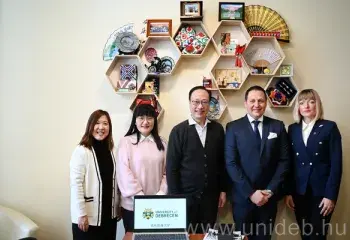
During the course of their visit to the University of Debrecen, the members of a delegation from the Education University of Hong Kong discussed opportunities for cooperation in research as well as teacher and student exchanges. Thanks to this successful establishment of contacts, the representatives of the two institutions are expected to sign an agreement on this issue this coming spring.
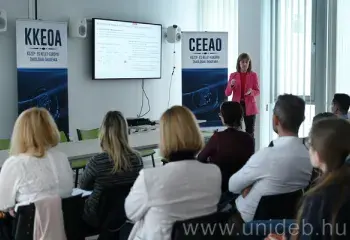
Experts from the University of Debrecen have participated in an international symposium reporting on the results of microbiome-related research conducted at our institution, while focusing primarily on its clinical and oncological implications. Besides presenting the recent relevant research results and findings, the meeting on Thursday also provided an opportunity to initiate and establish new research collaborations that would lay the foundation and provide a roadmap for new drug development programs in the future.
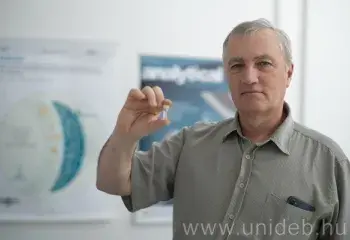
A new procedure developed by a research group at the Faculty of Science and Technology of the University of Debrecen (FST, UD) may open up new avenues and provide a roadmap for future mass spectrometry analyses. This new testing method significantly reduces the time and cost of mass spectrometry measurements of proteins both in the pharmaceutical industry and protein research. The publication that summarizes the scientific finding has appeared in one of the most prestigious international chemistry journals, Angewandte Chemie.

The latest findings and results of an international, interdisciplinary research project initiated and launched by the Faculty of Humanities at the University of Debrecen were presented in December at Concordia University in Montreal, Quebec. Attendants at the event could learn about the relevant publications released so far, an interactive map available in two languages, and the long-term plans for continuing the research activities.
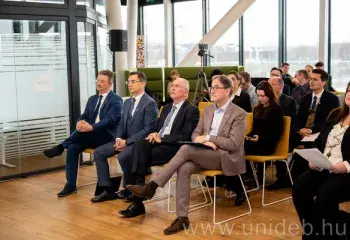
As a consequence of the automotive investments in Debrecen, our city has become a new center of the automotive industry in Central Europe, which exerts significant influence on the life of Debrecen. In order to study the overall impact, a research group called DEB AUT has been established at the University of Debrecen, which examines how this kind of development affects employment, training needs, university structure, urban transport, cultural life and social mobility.
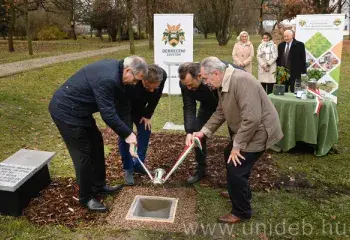
It is the first Hungarian space plant experiment, called Vitapric program, that the time capsules placed on Tuesday at the Böszörményi úti campus of the University of Debrecen are supposed to commemorate in the framework of the 4th Plant Breeding Memorial Day and Conference. These capsules contain items from the scientific experiments conducted by Tibor Kapu, the second Hungarian astronaut, as part of the mission Axiom-4 on board the International Space Station (ISS), including sowing seeds, documents and special implements. Bertalan Farkas, the first Hungarian astronaut, was also present at the placement of the capsules.
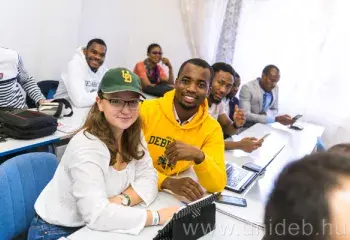
During the past couple of years, the number of international students at Faculty of Health Sciences of the University of Debrecen (DE ETK), both in Debrecen and Nyíregyháza, has been steadily increasing. By the 2025/2026 academic year, the number of students coming from outside Hungary to enroll at the faculty has reached almost six hundred. According to the deputy dean for academic affairs and education at DE ETK, most young foreigners choose the programs offered by the faculty because of the wide range of courses inherent in them in addition to the professional experience opportunities available and international embeddedness of our institution.
